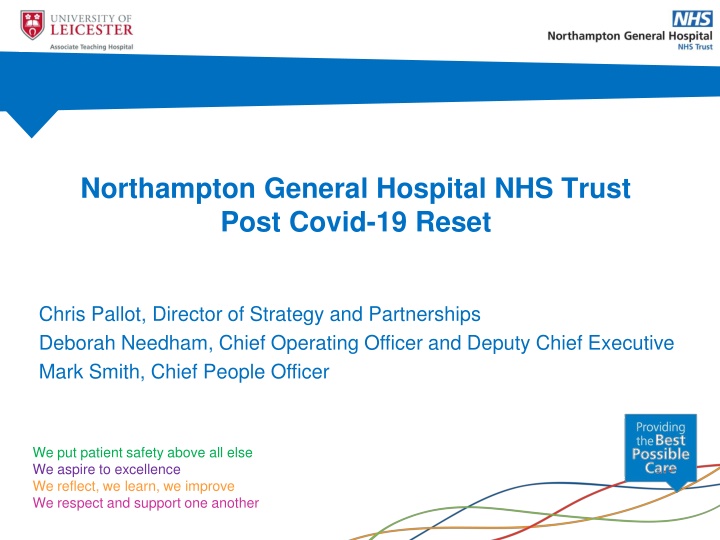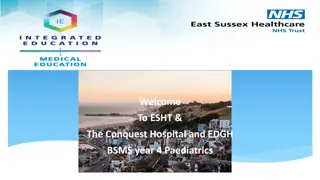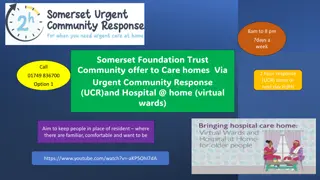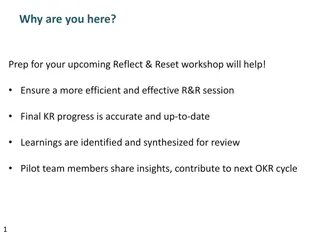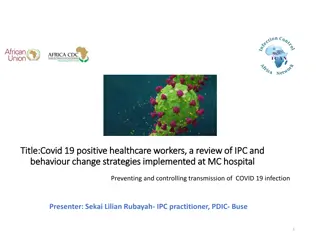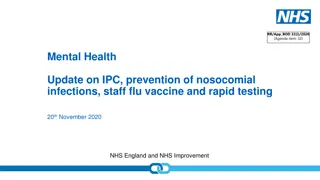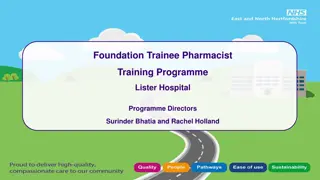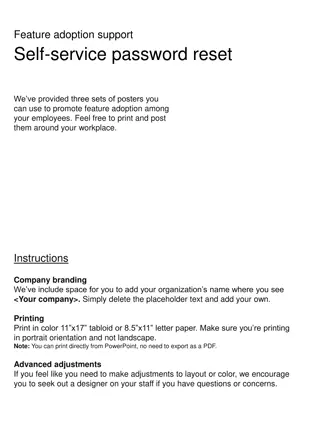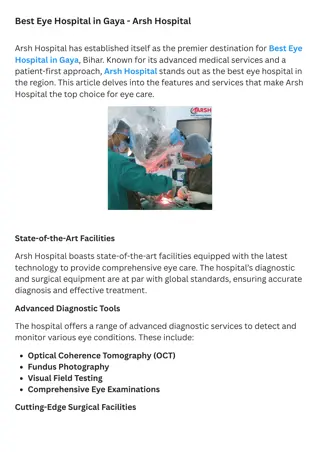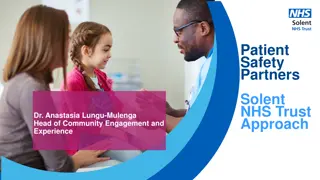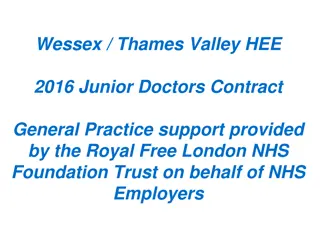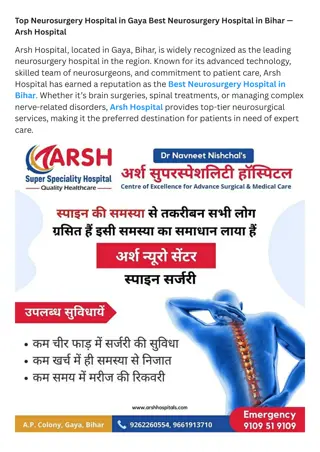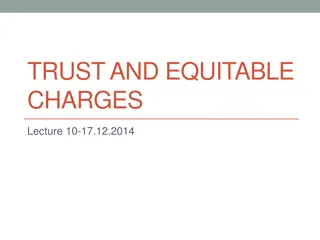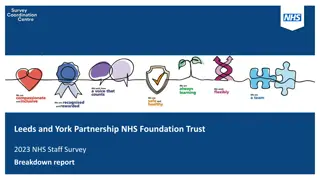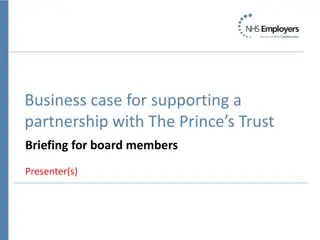Northampton General Hospital NHS Trust Post Covid-19 Reset Overview
Northampton General Hospital NHS Trust is prioritizing patient safety and excellence in healthcare post Covid-19. Their reset and recovery phase aims to resume urgent non-Covid services safely, focusing on cancer care, diagnostics, and outpatient treatments. The hospital has maintained 80% of pre-Covid outpatient activity, with a key emphasis on cancer diagnostics and treatments. Elective and day case activities are gradually increasing, with a waiting list position of 4932 patients. The hospital is actively monitoring and improving wait times to provide timely care to patients.
Download Presentation

Please find below an Image/Link to download the presentation.
The content on the website is provided AS IS for your information and personal use only. It may not be sold, licensed, or shared on other websites without obtaining consent from the author.If you encounter any issues during the download, it is possible that the publisher has removed the file from their server.
You are allowed to download the files provided on this website for personal or commercial use, subject to the condition that they are used lawfully. All files are the property of their respective owners.
The content on the website is provided AS IS for your information and personal use only. It may not be sold, licensed, or shared on other websites without obtaining consent from the author.
E N D
Presentation Transcript
Northampton General Hospital NHS Trust Post Covid-19 Reset Chris Pallot, Director of Strategy and Partnerships Deborah Needham, Chief Operating Officer and Deputy Chief Executive Mark Smith, Chief People Officer We put patient safety above all else We aspire to excellence We reflect, we learn, we improve We respect and support one another
Overview On the 29April 2020 Simon Stevens (NHS Chief Executive) set out the second phase of NHS response to Covid-19. This phase of reset and recovery requested the NHS to begin to step up non Covid-19 urgent services as soon as possible. Any restart needs to be safe . The overall reset programme is being led by the Director of Strategy & Partnerships The Trust initiated a twice weekly reset group led by the Silver Commander with clinical and operational leads for each of the reset programmes. As we move into month 4 of 2020/21 and in anticipation of phase 3 we have taken stock of the current position and set out the reset priorities going forward. We have reset urgent treatments, screening services, cancer, diagnostics and are undertaking some routine outpatients, direct access and elective treatments. Cancer diagnostics & treatments will take priority over routine referrals. The Trust fast adoption of new technologies and ways of working has allowed us to maintain 80% of pre Covid-19 outpatient activity.
Activity overview Elective & Day case Overall waiting list position is 4932, made up of 3651 day cases and 1281 inpatients The waiting list decreased to 2345 at the end of April 2020 as validation was undertaken Elective activity undertaken is at 35% pre Covid-19 levels compared to 44% regionally Day case activity is at 35% pre Covid-19 levels compared to 41% regionally Overall wait times have increased and are currently average - 17 weeks Through the pandemic 449 patients have had their surgery undertaken at BMI Three Shires hospital 310 patients have waited over 52 week 44 patients are awaiting diagnostics 34 are awaiting outpatient appointments (7 of which have an appointment date) 221 are awaiting TCI Next Steps All category 1 (urgent) patients treated at Three Shires Hospital (TSH)/NGH with some capacity for category 2/3 patients Two theatres opened in main suite, plus gynaecology theatres for elective operating to repatriate from TSH Orthopaedics relocated to TSH in place Althorp designated as the green surgical ward
Cancer Target Performance Cancer waits - 31 days Target Jan-20 Feb-20 Mar-20 Apr-20 Cancer: Percentage of patients treated within 31 days - from diagnosis to first definitive treatment 96% 95.4% 96.7% 99.4% 94.9% Cancer: Percentage of patients for second or subsequent treatment treated within 31 days - surgery 94% 81.8% 100% 100.0% 87.5% Cancer: Percentage of Patients for second or subsequent treatment treated within 31 days - drug 98% 96.7% 98.3% 96.9% 93.9% Cancer: Percentage of Patients for second or subsequent treatment treated within 31 days - radiotherapy 94% 92.5% 98.8% 96.5% 93.0% Cancer waits - 62 days Target Jan-20 Feb-20 Mar-20 Apr-20 Cancer: Percentage of patients treated within 62 days urgent referral to treatment of all cancers 85% 66.4% 60.2% 78.7% 64.4% Cancer: Percentage of patients treated within 62 days of referral from screening 90% 93.5% 91.6% 87.0% 86.9% Cancer: Faster Diagnosis Standard 70% 63.8% 68.9% 65.0% 52.6%
2ww patients on the cancer patient list Total patients on list Diagnosed Undiagnosed 1600 1400 1200 1000 800 600 400 200 0 7/1/2019 8/1/2019 9/1/2019 10/1/2019 11/1/2019 12/1/2019 1/1/2020 2/1/2020 3/1/2020 4/1/2020 5/1/2020 6/1/2020 7/1/2020 Date Diagnosed Undiagnosed Total on PTL % diagnosed 97 1110 100 1132 87 1124 64 1236 88 1256 70 1190 75 1221 76 1245 53 1172 46 836 30 694 45 911 54 1144 During the pandemic the number of 2 week wait referrals decreased. 01/07/2019 01/08/2019 02/09/2019 07/10/2019 04/11/2019 02/12/2019 06/01/2020 03/02/2020 02/03/2020 06/04/2020 04/05/2020 01/06/2020 06/07/2020 1207 1232 1211 1300 1344 1260 1296 1321 1225 882 724 956 1198 8.0 8.1 7.2 4.9 6.5 5.6 5.8 5.8 4.3 5.2 4.1 4.7 4.5 Following national guidance high volume (colonoscopy, upper GI, endoscopy and bronchoscopy), elective surgery and palliative chemotherapy were paused at the main NGH site Elective surgery and colonoscopy were transferred to BMI Three Shires with cases requiring Cancer surgical first definitive treatment capacity at 100% of pre Covid-19 levels (March v June) 2WW referrals are now back to pre Covid-19 levels
Patients on the cancer list who have been diagnosed Diagnosed patients over 62 days as at 29/7/2020 14 12 117 patients of the total list have waited over 62 days 21 have a diagnosis and are requiring treatment. 12 have a treatment start date. 96 patients have not yet been diagnosed. 42 are waiting for a diagnostic test which has been booked, 3 are waiting to agree a date. Following national guidance high volume diagnostics were paused during the pandemic. Some elective surgery and colonoscopy were transferred to BMI. Additional endoscopy capacity is in place and increased operating capacity at NGH will be in place from 4th August 2020 Radiology diagnostic wait times remain at 7 days despite a decrease in capacity. 10 8 6 4 2 0 Undiagnosed Legacy as at 29/7/2020 50 40 30 20 10 0 Awaiting Diagnostic (booked) non-cancer patient to be informed OPA to be booked Endoscopy to be booked Diagnostic to be booked Awaiting Histo/Report Awaiting clinical review/Next step Awaiting MDT TCI booked OPA Booked 2 2 14 3 42 3 9 12 6 3
Cancer: Next Steps A reset group has been established which meets weekly - Areas of focus identified from a gap analysis include: Individual tumour site gaps & recovery plans Streamlining MDT meetings Stratified pathways Diagnostics capacity & demand regional endoscopy support National pathways - Lung and Prostate timed pathways Supported self-management 2ww triage of referrals Endoscopy Total Backlog (inc routine) 800 patients (including Urology) Additional 12 lists per week In total operating at 60% pre Covid-19 capacity with 40% levels on lists Planned 12-15 weeks to clear current backlog (five weeks to clear 2 week wait backlog). Senior clinical triaging, risk assessing and prioritising all referrals Additional capacity for surgical endoscopy sourced in TSH. NGH utilising insourcing an external provider to support Saturday lists Established system endoscopy reset group facilitating collaborative working across the county
Staff Welfare and Support We put patient safety above all else We aspire to excellence We reflect, we learn, we improve We respect and support one another
Staff Health and Wellbeing Diversity & Inclusion Protecting our BAME Staff As you will be aware there is emerging evidence that is currently being reviewed by Public Health England which shows that black, asian and minority ethnic (BAME) communities are disproportionately affected by Covid-19. This concerning evidence suggests that the impact may also be higher among men and those in the higher age brackets. The reasons for this are not yet fully understood, but the health inequalities present for BAME communities have long been recognised. Risk Assessments A total of 1983 members of staff have been identified at BAME and lists of these staff have been provided to managers to enable them to make contact and identify any action and support that may be required. Of the 1983 members of staff identified over 80% of colleague have now been met with. There needs to be an assessment of lessons learnt from the RA feedback Next steps include conducting welfare risk assessments for all colleagues
RESET - What Next Our Cell STAFF, STAFF WELFARE AND VOLUNTEERS 1000 plus challenge Re-aligning the workforce ways of working agile/flexible Current Staff Guidance on UHC/pregnancy Schooling Childcare Contact programme FAQs Staff swabbing New Staff 3 year medical students 1/2/3 nurses Returners HCA recruitment Honorary contracts Redeployment register Maximise Staffing Levels Enabling attendance Support alternatives Streamlining Multi-sourcing OH advice Wellbeing support Kindness FTSU link Car parking Accommodation Water bottles SOS Ourspace Managing the complexity Covid-19/bau Restart Transformation SOS brief Health & Wellbeing centre Social capital Staff Wellbeing Access to things that matter and work Indirect and direct support Professional advice Volunteers Retain and value existing Focus Train new Assign hotspots National helpline Patient support Kindness support Integration of kindness / volunteers BC/PPoint/Bronze Cell
What Next Workforce RESET Plans Improving attendance focus on enabling the safe and supported return to work of those people who are needed to deliver patient care as reset is restricted by the number of staff not here Improving absence analysis and information given to managers Supporting managers in changing the conversation Understanding the longer term absences and those not returning as planned from self isolation Preparing for any new guidance on those shielding Refocus on causes of transmission and staff role in mitigating this responds to outbreaks, examples of poor practice, social distancing, test and trace etc Joint work between IPC,OD, governance and comms to remind of causes, mitigations and how to access support Will include masks once guidance issued Working with hotspots Supporting those working from home Exploring modules that can be undertaken remotely- resilience first one completed
What Next Workforce RESET Plans Psychological safety SoS team expansion significant demand on this team Working as part of system to identify support Supporting divisions as they bring back staff and manage reintegration Leadership through difficult times Draft framework complete next step is to merge with transformation programmes Key points for leaders ready to share Supporting reset Division reset conversations in place Alignment between OD and transformation team Antibody testing and test and trace support Supporting the change in conversations Picking up the things that were paused e.g. mandatory training, case work
